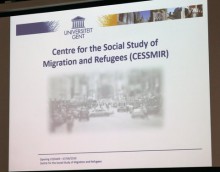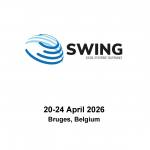Borders as Markets: How fighting migration became big business

Prof. Ruben Andersson (University of Oxford)
Friday 28/02, 10:30-12:30 | Academieraadzaal
Bordering Europe.
Research seminars on the securitization of Europe’s migration policies.
The lecture series is organized by the Centre for the Social Study of Migration and Refugees (CESSMIR), in collaboration with UNU-CRIS and the Department of Conflict and Development Studies (Ghent University). The speakers have been invited to give a public lecture as part of the ‘Debating Conflict and Development 2020’ series on Bordering Europe. In the research seminars below, three speakers will also present their most recent work, and engage in discussion with researchers. We would like to encourage especially those who are interested in securitarisation, deportation, borders, immobility and Europe’s externalization policies to join us in these seminars.
Abstract
The securitised 'fight against migration' is a fairly recent historical development that, in the span of a few decades, has become a multibillion-dollar industry. In this lecture, I will argue that this industry in large part has fed off its own apparent failures, while also managing to export the risks it generates to less powerful people and communities - including, of course, to migrants and refugees themselves. First, we will look at the perverse political and economic incentives that now exist for reinforcing border security, with particular focus on the role of 'partner states', drawing on my ethnographic research in West and North Africa as well as on the critical analysis of the 'border business' provided by migrants themselves. Second, we will consider the economies of risk enabled by the 'externalisation' of migration controls, which in essence has allowed more powerful states to 'dump the problem' in someone else's backyard (though not always with complete success). Third and finally, we will dig deeper to consider the disturbing ways in which migratory life itself is becoming a political and economic resource for border security actors (as well as for criminals) - showing how migrants may be just an extreme example of a wider trend of exploiting human vitality in 'surveillance capitalism' today.
Biography
Ruben Andersson is Associate Professor of Migration and Development at the Oxford Department of International Development (ODID) at the University of Oxford. Andersson is an anthropologist working on migration, borders and security with a focus on the West African Sahel and southern Europe. He is the author of Illegality, Inc.: Clandestine migration and the business of bordering Europe (University of California Press 2014), an ethnographic account of European efforts to halt irregular migration, accompanies border agencies, aid organisations and migrants along the Spanish-African borders. The book shows how the ‘fight against irregular migration’ has fuelled distress and drama at the borders, which in turns has led to the expansion of a self-reinforcing industry of controls. Andersson’s latest book No Go World: How fear is redrawing our maps and infecting our politics (University of California Press 2019) looks comparatively at remote-controlled interventions and the selective withdrawal of international actors from global 'crisis zones'. Taking as its starting point the conflict in Mali in the West African Sahel, it explores how the mapping of danger, the perception of risk and the politics of fear have all contributed to framing and fuelling security, aid and border interventions in the Sahel as well as in other settings such as Somalia, Libya and Afghanistan. Prior to joining ODID, Ruben worked at the London School of Economics and at Stockholm University, where he remains an associated researcher.
If you are planning to attend, please register via the link below. Registration is free, but places are limited.
https://webappsx.ugent.be/eventManager/events/RubenAndersson
Upcoming Events
Similar Events
No events found.


